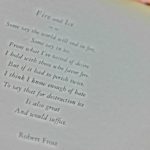Paul Martínez Pompa, writing for Poetry‘s blog “Harriet,” pooh-poohs my recent Public Discourse piece, in which I warn against so-called “Flarf” poetry as only the latest manifestation of ideological use of art. Suggesting that I have not “read anything ever written about poetry or aesthetics,” he states that my piece argues for “a rejection of the modernist / postmodernist tendency to experiment with form.” Of course, I suggested nothing of the sort. First, I never used the terms “modern” or “postmodern”—terms, I have argued elsewhere, that are essentially meaningless with respect to poetry. Second, I did not reject experimentation with form either—quite the opposite. I noted, for example, with reference to Jacques Maritain, how the rules of art are far greater in number, more plastic than the rules of other crafts and how such rules are in need of constant discovery and renewal. “Maritain,” I noted, “also provides a helpful explanation of why the fine arts, unlike other arts (such as carpentry) are in need of constant renewal”:
Once “a new adaptation of the fundamental and perennial rules” of art and poetry are applied mechanically to the medium via “pure technique,” “the rules formerly living and spiritual become materialized,” and a “renewal,” a new discovery, “will be necessary.”
Far from a nostalgic yearning to return to established forms, the short piece was a call to recognize the inescapability of form and its roots in the natural order of things. As Rudolf Arnheim argued in his classic study, Entropy and Art, absolute formlessness, chaos, is imperceptible. Even seemingly formless things have a form of some sort, however complex. An acceptance of the inescapability of hierarchy and the pleasure that its recognition produces in works of art—both paintings and poems—would, I argued, free poets from the tyranny of a poseur avant-garde that sees art as merely a tool in subversion.
Pompa also wonders if I dismiss Flarf “because of its formal properties, or because of its content, which is gleaned from that most seemingly unnatural of all spaces, the web.” But my argument was merely that Flarf is no golden ticket to poetry’s relevance because it fails to treat the root problem of poetry’s irrelevance—its commitment to ideology or, more correctly, a certain faux-ideology, espoused or imitated because of the cultural benefits of seeming to be avant-garde. (It goes without saying, of course, that there are many great poems being written today. We are dealing here, large-brush, with general tendencies.)
Start your day with Public Discourse
Sign up and get our daily essays sent straight to your inbox.Pompa does ask: “But which forms, precisely, are ‘natural?’ Which are not? And where (geographically, historically) do these ‘natural’ forms come from?” These are good questions and related in part to the possibility of avoiding ideology in poetry. One might ask, for example, whether all creative and intellectual efforts come from a certain perspective, with certain assumptions about the nature of the world, and whether this is what is meant by the word “ideology”? If so, ideology is impossible to avoid.
While all creative work is indeed informed by the artist’s or poet’s view of the world, I think there is an important distinction to be made between an ideology and a “view of the world.” All ideologies are also views of the world, but not all views of the world are ideological. An ideological view of the world is one in which one central idea is systematically applied to all of life, whether or not this central idea explains all aspects of life satisfactorily. For example, the idea—somewhat common now—that all statements are ideological is itself a very ideological statement. It is applied to all utterances despite the fact that such a statement is tautological and fails to explain how people really view all sorts of statements—from statements made in journals such as Science and Nature, to statements of love made to one’s spouse or children, to a statement made in a court of law under oath.
Views of the world, however, that attempt to take into account the inescapability of meaning and significance, while still very much based on certain assumptions about the nature of the world, are far less ideological to the extent that they take into account how people really use language. The more accurately such a view explains how people use language, the more likely that the assumptions upon which it is based are correct.
Similarly, then, there is a distinction between ideological art and art that attempts to take into account certain seemingly inescapable elements of art—elements such as signification, some element of hierarchy, some element of self-reflexivity of sound or meter, some sort of closure, ambiguity, and so forth. Ideological art attempts to undermine one or more of these things in the application of one central idea to the work. This is the difference between what I called ideological and natural art or poetry.
Beyond signification, hierarchy, self-reflexivity, closure, and ambiguity, what are other new discoveries in natural forms? To be honest, I am not sure, but this is really a question for poets.
In some respects, asking this is like asking a chemist what new isotope he will discover next. Who knows? However, having mastered the rules of his science, the chemist works to discover new rules, new compounds, and, therefore, contributes to his craft.














